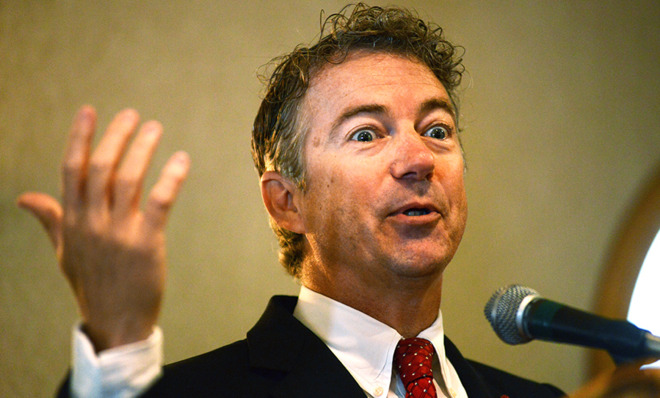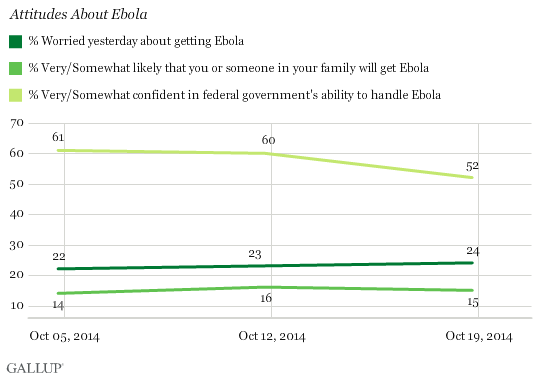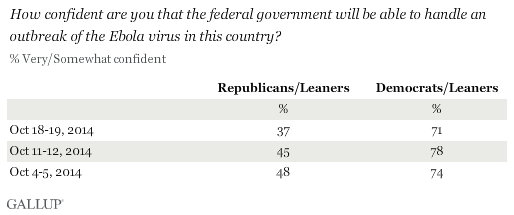Did Republicans overshoot on the Ebola panic?
GOP candidates have pounded the big red panic button. What if they look like Chicken Little come Election Day?


A free daily email with the biggest news stories of the day – and the best features from TheWeek.com
You are now subscribed
Your newsletter sign-up was successful
In mid-October, there was a palpable sense that America was on the cusp of an Ebola outbreak: Thomas Eric Duncan, a Liberian man who flew to the Dallas area carrying the virus, had died, and two of the nurses who tended to him contracted Ebola in the process.
There were at least 70 other potential cases at Texas Health Presbyterian Hospital Dallas alone, plus the people Duncan came in contact with and those who interacted with nurses Nina Pham and Amber Vinson, the latter of whom flew on passenger jets to and from Ohio.
By late last week, other nurses at the hospital and the national nurse's union were painting a damning portrait of a hospital totally unprepared to handle a deadly virus. The Centers for Disease Control and Prevention acknowledged promoting inadequate safeguards for hospitals and overselling America's readiness to handle West Africa's Ebola pandemic. America was in the throes of Ebola panic — and Republicans were feeding the flames.
The Week
Escape your echo chamber. Get the facts behind the news, plus analysis from multiple perspectives.

Sign up for The Week's Free Newsletters
From our morning news briefing to a weekly Good News Newsletter, get the best of The Week delivered directly to your inbox.
From our morning news briefing to a weekly Good News Newsletter, get the best of The Week delivered directly to your inbox.
Republican campaign ads and debates have featured dire warnings about Ebola crossing the U.S.-Mexico border. Sen. Rand Paul (R-Ky.) bucked the experts and called the virus "incredibly contagious," accusing the White House of lying about its risks. Republican after Republican has said that Obama dropped the ball on the disease and is "not protecting our country and our families from Ebola," in the words of Arkansas Rep. Tom Cotton, who's running to unseat Sen. Mark Pryor (D-Ark.).
So far the strategy seems to be paying off. According to a new Gallup poll, Ebola is now seen as among the top 10 issues facing America, above terrorism, crime, poverty, hunger, and homelessness. In another survey released late Tuesday, Gallup reported that confidence in the U.S. government's ability to handle Ebola is dropping, too.

What accounts for falling confidence? Politics, says Gallup's Frank Newport: "In recent days, several Republican Senate and House candidates running for election have adopted criticisms of the administration's response to the Ebola situation as talking points in their campaign, and rank-and-file Republicans appear to have picked up on this theme." Here's how the confidence numbers break down by party affiliation:

But here's the thing about pounding the big red panic button: What if nothing happens?
A free daily email with the biggest news stories of the day – and the best features from TheWeek.com
Duncan died in the U.S., but he's the only one so far. His fiancée and everyone who came in contact with him before he was hospitalized have been declared Ebola-free. The first nurse he infected, Pham, was just upgraded to good condition from fair, and Vinson's mother says her daughter is already testing negative for the virus. Freelance NBC cameraman Ashoka Mukpo, who contracted the virus in Liberia, was released from Nebraska Medical Center on Wednesday, making him the fifth person who has recovered after being treated in the U.S.
The CDC has issued new advisory guidelines for U.S. hospitals — it can't force them to adopt the new safeguards — and the Department of Homeland Security has beefed up West African passenger screening, directing all passengers from affected areas to pass through five U.S. airports. All visitors from the affected nations will be monitored for 21 days. Hospitals will be better prepared for the next Ebola patient, assuming there is one.
Even the seriously dire outbreak in West Africa could have numbered days. On Wednesday, Elhadj As Sy, secretary-general of the International Federation of Red Cross and Red Crescent Societies, predicted that the Ebola pandemic could be contained in four to six months.
There's always the slim possibility that the experts are wrong, or some accident of history or biology allows Ebola to enter the U.S. and spread like wildfire. If it does that before the Nov. 4 election, Republicans will look pretty prescient. If nothing new happens in the U.S. in the next two weeks, they'll look mildly delirious, or at least prone to hysteria. Even some prominent Republicans are finding it politically (and practically) expedient to distance themselves from the Ebola fearmongering:
Voters may forget about a topic after it falls out of the news — remember the great avian flu terror of 2005? — but will they forgive a party that cried wolf? Good thing early voting has already started.
Peter has worked as a news and culture writer and editor at The Week since the site's launch in 2008. He covers politics, world affairs, religion and cultural currents. His journalism career began as a copy editor at a financial newswire and has included editorial positions at The New York Times Magazine, Facts on File, and Oregon State University.
